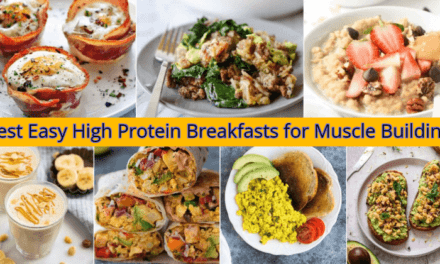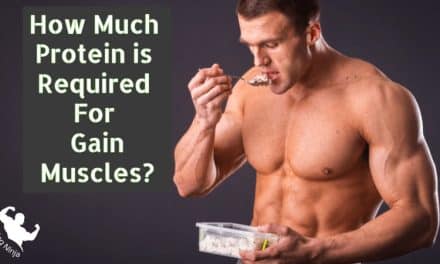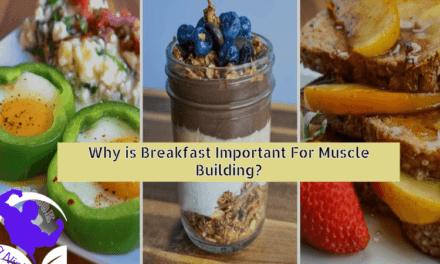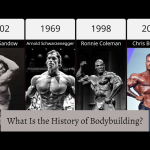Welcome to our latest blog post where we dive deep into the intriguing question: “Can you build muscle with maintenance calories?” In the world of fitness and body transformation, the concept of bulking and cutting has long been the go-to strategy for building muscle and shedding fat.
However, recent trends in nutrition and exercise science have sparked a new debate – is it possible to pack on muscle mass while maintaining a steady intake of calories that merely sustains your current weight?
In this article, we’ll explore the fascinating intersection of muscle growth and maintenance calories, delving into the science behind muscle gain, the role of caloric balance, and whether this paradigm-shifting approach is supported by evidence or just another passing fitness fad. Get ready to challenge conventional wisdom and discover the potential of sculpting your body without the traditional feast-and-fast cycle.
Table of Contents
- Can You Build Muscle With Maintenance Calories?
- What is maintenance calories?
- Is Maintaining Better Than Bulking?
- Is It Possible To Build Muscle Eating Maintenance Calories?
- How Long Can You Stay On Maintenance Calories?
- Why Am I Gaining Weight On Maintenance Calories?
- Is It better To Go Over Maintenance Calories?
- When Is Eating Maintenance Calories Recommended for Building Muscle or Hypertrophy?
- How Many Calories Above or Over Maintenance To Build Muscle?
- How Many Calories Above or Over Maintenance To Build Muscle?
- How Much Muscle Can Someone Gain With Maintenance Calories?
- How Many Calories Do I Need To Get Ripped?
- Frequently Asked Questions
- How to build muscle on maintenance calories?
- Why do bodybuilders need so many calories?
- How many calories above maintenance to build muscle?
- Can you gain strength on maintenance calories?
- How many calories per pound to gain muscle?
- How many calories to gain muscle, but not fat?
- How many calories should i eat to gain muscle female?
- How much calorie surplus for weight gain?
- Can you build muscle in a calorie deficit?
- Can you build muscle while eating at maintenance ?
- Can you gain muscle on maintenance calories?
- What is building muscle in a calorie deficit?
- can you build muscle while eating at maintenance?
- Can I gain muscle on maintenance calories
- How do you building muscle at maintenance calories?
- Can I build muscle at maintenance calories?
- Can I eat at maintenance and gain muscle?
- Can you build muscle on maintenance calories?
- Conclusion
Can You Build Muscle With Maintenance Calories?
Yes gaining muscle at maintaining calorie intake is indeed possible, and it revolves around the concept of progressive overload. By progressively increasing the intensity, weight, reps, or duration of exercise, individuals can stimulate building muscle on maintenance calories. It’s important to note that the quality of nutrients plays a vital role in this process. A balanced intake of Insufficient are the necessary proteins, beneficial fats, and intricate carbs provides the necessary building blocks for muscle development.
To achieve optimal gaining muscle at maintenance calories, individuals may need to create a slight caloric surplus of 10-15% above their total daily energy expenditure (TDEE). This surplus ensures that the body has enough energy and resources to support muscle synthesis. By strategically increasing caloric intake while maintaining the right balance of nutrients, individuals can effectively support muscle growth.
Furthermore, it’s crucial to understand that training-induced muscle growth follows a non-linear pattern. At a certain point, simply maintaining the same level of intensity are not enough. In order to optimize muscle development, people need prioritize factors such as adequate rest, appropriate nourishment, and a steady workout routine regimen.
These elements work synergistically to optimize the body’s response to training stimuli and facilitate muscle adaptation.
What is maintenance calories?
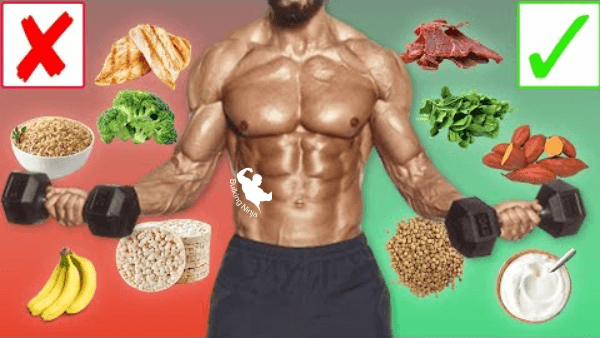
Maintenance calories refer to the specific number of calories required by your body to sustain its energy expenditure. These calories provide the necessary fuel for essential bodily functions, such as breathing, blood circulation, temperature regulation, and maintenance organ function.
In other words,gaining muscle at maintenance calories are the amount of energy needed to maintain your current weight and overall bodily functions without gaining or losing weight. Study more about Dumbbell Pullover best for Lower chest Muscles.
By accurately determining your maintenance calories, you can ensure that you provide your body with the right amount of energy for optimal functioning. Read about how to mentally ready for exercise?
As a Beginner Lifter Body Recomposition Is Possible on Maintenance Calories.
When beginning a fitness plan, it is common to see results rapidly. This is due to the fact that the nervous system is not efficient at moving muscles in new ways. Even while eating to maintain weight, there will still be muscle growth. This initial phase, known as neural development, typically lasts roughly 8 weeks. It is then followed through hypertrophy, which is the real expansion of the cells in the muscles. Read more about BJJ can build muscles.
For those who are new to lifting or following a beginner hypertrophy program, muscle building goes into overdrive and can stay that way anywhere from a few months up to one year. This phenomenon is commonly referred to as newbie gains. As the body adapts and builds endurance to the workouts, the progress may slow down dramatically. Read more about you can gain muscles faster with best food.
During this process, it is important to stay consistent with your fitness plan and maintain a proper balance of nutrition. By challenging your muscles through lifting and engaging in regular workouts, you can continue to stimulate muscle growth and progress. While the initial gains may be quick, remember that building muscle is a gradual process that requires time and dedication.
Is Maintaining Better Than Bulking?

When it comes to fitness regimens, individuals have varying goals and fitness needs. The question of whether maintaining or bulking is better depends on the individual’s specific goals and circumstances.
For those seeking to increase muscle size, strength, and definition, a bulking approach may be an appropriate option. This approach typically involves increased caloric intake, coupled with strength training, to promote muscle growth and achieve a desired muscle mass.
On the other hand, individuals aiming to maintain a healthy weight or improve muscular endurance may find maintaining their current physique to be a better option.
This approach involves combining strength training workouts with a sensible diet that focuses on preserving muscle while managing body fat levels. By tailoring the regimen to individual needs, individuals can effectively address their specific fitness goals. Futher more study important Types of Push ups for Grow Muscle.
Is It Possible To Build Muscle Eating Maintenance Calories?
Gaining muscle on maintenance calories is possible in certain cases.
Weight training is effective for muscular gain, even when eating at maintenance. In fact, most people who have been consistently weight training for a few months and beyond can see muscle development with a maintenance diet.
While a calorie surplus is typically recommended for optimal muscle growth, it is important to note that muscle building can still occur with maintenance calories. It may take longer and progress may be slower, but results are achievable.
The key lies in focusing on progressive overload during weight training sessions and ensuring sufficient protein intake to support muscle repair and growth. Consistency and adherence to a well-rounded diet and exercise regimen are crucial. Futher more study important of Eggs for Grow Muscle.
How Long Can You Stay On Maintenance Calories?
individual goals and health needs play a crucial role. Depending on the desired body composition and performance goals, gaining muscle on maintenance calories can be a valuable tool to achieve desirable outcomes.
It is essential to stay on gaining muscle at maintenance calories for a suitable length of time to prevent further weight gain or support weight loss if necessary.
Maintaining a healthy weight and body composition is another aspect to consider. An active lifestyle and proper nutrition, tailored to individual nutritional needs, are key components in achieving these goals.
It is advisable to consult with a doctor or registered dietitian who can determine how long an individual should stay on maintenance calories based on their unique health and fitness objectives. Futher more study about Best Types of Sports for Grow Muscle.
Why Am I Gaining Weight On Maintenance Calories?
many several factors can contribute to weight gain. Gaining weight can occur due to a variety of reasons, such as consuming extra calories over time or having higher stress levels that lead to reaching for comfort food and increased calorie intake.
Additionally, a slow metabolism may make it harder to achieve the desired weight, and forgetfulness or lack of awareness about calorie tracking can result in unintentionally consuming more calories than expected.
To successfully build muscle at maintaining weight, it’s important to be mindful of calorie intake and maintain awareness of the amount of food consumed each day.
By monitoring your caloric consumption and guaranteeing it aligns with your maintenance calories, you can fuel your body with the necessary energy for workouts and muscle growth without experiencing excessive weight gain. Read more about Best exercises for upper chest muscles.
Is It better To Go Over Maintenance Calories?
When considering the topic of gaining muscle on maintenance calories, one strategy that can be used is bulking, which involves increasing caloric intake to support muscle growth and increase muscle mass.
By going over maintenance calories in certain circumstances, individuals have the potential to put on muscle and enhance their overall body size in a beneficial way.
However, it is important to approach this strategy with awareness and consideration for potential negative side effects. Consuming too many calories, particularly in an unhealthy manner or if left unchecked, can result in an increase in body fat.
Hence, it is essential to sustain regularity and establish a well-planned approach to ensure that the increase in caloric intake aligns with individual caloric goals and is done safely.
In order to successfully build muscle at maintenance calories, individuals need to stay consistent with their plan and be mindful of the consequences.
Consistently maintaining a regular intake of nutrients can be difficult significant amount of calories above maintenance, but with a well-defined strategy, it is possible to reach desired muscle-building goals effectively and efficiently.
When Is Eating Maintenance Calories Recommended for Building Muscle or Hypertrophy?
Usually, a calorie surplus is preferred for muscle growth, but there are certain cases where eating maintenance calories can be recommended.
- Maintenance Calorie Consumption During Rest Periods
- Maintenance Calorie Consumption at Target Weight
Eating at Maintenance Calories at Goal
Does Eating At Maintenance Work?
Yes the approach of eating at maintenance calories can be a successful and sustainable way to achieve your goals.
By consuming the exact number of calories needed to maintain your current weight, you can neither lose nor gain weight. This approach is useful in taking a break from strict dieting and allows you to reset your body.
When eating at maintenance, it can decrease your hunger, making it much easier to stay consistent with your eating plan.
While you may not experience immediate weight loss, this approach can help reset your metabolism, enabling you to burn more calories in the long run.
Do You Eat At Maintenance For Body Recomposition?
Eating at maintenance calories is a viable approach for achieving your fitness goals and body recomposition. By keeping your calorie intake level with your caloric output, you provide the necessary energy and fuel for muscle growth while efficiently utilizing nutrients. A balanced diet rich in protein, carbohydrates, and healthy fats from nutrient-dense sources is essential for reaching your desired body composition and overall health.
In addition to proper nutrition, engaging in physical activity is key. Combining strength training, cardio, and HIIT in your routine helps develop lean muscle while burning fat. Consistently participating in these activities aids in reaching your weight loss goals and maintaining a healthy body.
No matter your current fitness program or goals, adopting a consistent approach with proper nutrition and regular physical activity is the key to success. By focusing on a balanced diet, maintaining caloric balance, and staying active, you can achieve the desired body recomposition and build lean muscle while promoting overall health.
How Many Calories Above or Over Maintenance To Build Muscle?
Do You Need To Eat More To Maintain Muscle?
Eating more is key to building muscle and maintaining strength. To achieve this, it is important to meet your dietary needs by consuming enough nutrients, including lean proteins, carbohydrates, and healthy fats. A general rule of thumb is to divide your daily calories between these macronutrients.
Including fresh fruits and vegetables in your diet is essential as they provide essential vitamins and minerals. It is also crucial to limit processed foods, which may hinder muscle growth and maintenance. Giving your body enough rest is necessary for proper repair and the building of new muscle tissue.
Staying active and engaging in regular strength training is vital in the process of building strength. By doing so, you can speed up the development of lean muscle and enhance your overall muscle-building progress.
How Many Calories Above or Over Maintenance To Build Muscle?

Each individual is unique, and there’s no one-size-fits-all approach. Factors like starting body composition, energy burned during resistance training, and muscle gained need to be taken into account.
It is suggested to consistently track progress and make adjustments based on the results obtained over two weeks.
Guesstimating or relying on estimates may be off, so a better approach is to determine the exact amount of calories consumed through consistent tracking.
By doing so, one can confidently progress towards their muscle-building goals while maintaining their weight and staying on track with their fitness journey. Further more study about Gymnastics is best for Grow Muscle.
How Much Muscle Can Someone Gain With Maintenance Calories?
When starting a strength routine, individuals can expect to gain muscle depending on their body weight and the specific routine they follow. As they continue to build up their muscles and endurance, the rate of muscle gain may decrease, but it can still be significant.
Athletes who consume maintenance calories can still see progress and gain muscle, even if it’s not as rapid as in the beginning. Whether you are a beginner or at an intermediate level, the key is to stay consistent with your strength routine and maintain a proper diet. With time and effort, you can achieve your muscle-building goals.
In the end, achieving success requires the correct method and commitment. individuals can build muscle and improve their body composition over time, regardless of their initial fitness level or body weight. Let’s Start Your Bulking Journey with Best Easy High Protein Breakfasts for Muscle Building.
How Many Calories Do I Need To Get Ripped?
The amount of calories a person needs can vary depending on a variety of factors Factors like sex, stature, present body weight, and level of physical activity. To create a calorie deficit for weight loss, it is important to expend more calories than you take in.
Men and women, with their different body sizes, have slightly different caloric needs. The average caloric intake per day can serve as a starting point. Adjusting the daily calorie reduction over time is a safe and manageable approach.
It is crucial to fuel your body with adequate nutrients to support muscle recovery and growth during workouts. By listening to your body and following a healthy and balanced lifestyle, you can achieve weight loss in a safe and sustainable way, avoiding extreme fad diets and calorie restrictions.
Can I Still Gain Muscle In A Calorie Deficit?
Yes, you can still build muscle even with a calorie deficit. Although it may take longer to see significant gains, it is possible due to the fact that your body can utilize stored fat for energy during this time. By combining a calorie deficit with a regular workout regimen and proper nutrition, you can still achieve Developing muscle mass necessitates both consistency and patience in maintaining progress.
Eating enough protein is important to support muscle recovery and growth. Additionally, staying adequately hydrated and getting enough rest are important for overall muscle health. If you have any questions or concerns, it’s always a good idea to talk to a registered dietitian or doctor who can provide personalized guidance.
Remember, it’s important to stay committed and be consistent with your fitness routine and nutrition plan. While building muscle in a calorie deficit may require extra effort, it is possible to achieve your goals with the right approach and mindset. Let’s Start Your Bulking Journey with Important of Breakfasts for Muscle Building.
Is 3000 Maintenance Calories A Lot?
Individual person’s goals and activity level play a crucial role. It depends on their specific fitness goals. If someone is aiming to maintain their weight, the amount of calories they consume will depend on their activity level and overall objectives.
However, if their goal is In order to shed pounds, it is vital to create an imbalance in calorie intake. In such cases, consulting a certified nutritionist for personalized advice is always the best approach.
These professionals can offer personalized advice depending on individual circumstances person’s individual needs and help determine the optimal calorie intake for building muscle while achieving their desired weight and fitness goals.
Frequently Asked Questions
How to build muscle on maintenance calories?
To build muscle at maintenance calories:
Participating in progressive resistance exercises.Consume maintenance calories with adequate protein levels (>2g protein/1kg bodyweight).
By incorporating progressive resistance exercises alongside a balanced diet that includes sufficient protein, you can effectively build muscle while maintaining your current calorie intake.
Why do bodybuilders need so many calories?
Bodybuilders engage in intense physical activity and weight training, which requires additional energy and nutrients to support muscle growth and repair. Consuming a higher calorie intake ensures that their bodies have enough fuel to meet the demands of their training and promote optimal muscle development.
How many calories above maintenance to build muscle?
To build muscle, you typically need to consume calories above your maintenance level. The recommended range is to increase your total calorie intake by at least 3500 calories per week or approximately 500 extra calories per day, depending on your activity level. This surplus of calories provides the additional energy and nutrients needed for muscle growth and repair.
Can you gain strength on maintenance calories?
Yes, you can gain strength on maintenance calories with proper training and recovery.
How many calories per pound to gain muscle?
To gain muscle, the number of calories needed per pound of gained mass can vary depending on individual factors such as genetics, metabolic rate, and current muscle mass.
As a general guideline, consuming an excess Consuming a minimum of 2,500 calories every week can promote the growth of lean muscle tissue by one pound. However, it’s important to note that individual differences may affect the specific calorie requirements for muscle gain.
How many calories to gain muscle, but not fat?
For gain muscle it is recommended to increase your daily calorie intake by 5 to 10%. For instance, if your daily calorie needs are 2500, consuming an additional 250 calories per day can support lean muscle growth while minimizing the risk of excess fat gain.
How many calories should i eat to gain muscle female?
The recommended calorie intake for females looking to gain muscle can vary, but a general range suggested by fitness professionals is between 250-500 extra calories per day. It is important to find a balance that provides sufficient calories for muscle growth without leading to excessive fat gain.
How much calorie surplus for weight gain?
To achieve weight gain in a healthy manner, aim for a calorie surplus of around 300 to 500 calories per day. It is better for your body to gain weight gradually rather than rapidly.
Can you build muscle in a calorie deficit?
Yes, you can build muscle in a calorie deficit, but it’s more effective for beginners or those with higher body fat percentages. To do this:
-
Protein: Consume enough protein (1.2-2.2g/kg body weight) for muscle repair and growth.
-
Strength Training: Focus on compound exercises like squats and deadlifts.
-
Calorie Deficit: You’ll lose weight but also some muscle, so maintain a moderate deficit.
-
Progressive Overload: Increase exercise intensity over time.
-
Rest and Recovery: Get enough sleep and allow muscles to recover.
-
Patience: Muscle gain in a deficit is slower than in a surplus.
-
Monitoring: Track progress and adjust as needed. Eventually, consider cycling between bulking and cutting phases for better results.
Can you build muscle while eating at maintenance ?
A begineer think about Can you gain muscle while maintenance calories its answer is. Yes, you can build muscle while eating at maintenance calories, especially if you’re a beginner or have reached a plateau in your progress.
Can you gain muscle on maintenance calories?
Yes, you can gain muscle on maintenance calories, particularly if you optimize your nutrition and training.
What is building muscle in a calorie deficit?
Building muscle in a calorie deficit means gaining muscle while eating fewer calories than you need to maintain your weight. To do this:
- Eat enough protein to support muscle growth (about 1g per pound of body weight).
- Do strength training workouts to stimulate muscle growth.
- Get adequate rest and sleep.
- Balance your macronutrients (carbs, fats, and protein).
- Monitor your progress and be patient.
This approach can help improve your body composition, but it’s slower than traditional bulking with a calorie surplus. Consulting a fitness expert or dietitian can be helpful.
can you build muscle while eating at maintenance?
Yes, you can build muscle while eating at maintenance, but progress may be slower compared to eating in a calorie surplus.
Can I gain muscle on maintenance calories
How do you building muscle at maintenance calories?
To build muscle at maintenance calories, focus on:
- Regular strength training with progressive overload.
- High protein intake from sources like lean meats and legumes.
- Eating a balanced diet to meet nutrient needs without excess calories.
- Prioritizing recovery with sufficient sleep and rest.
- Being consistent and patient, as muscle growth can be slower at maintenance calorie levels.
Can I build muscle at maintenance calories?
Yes, you can build muscle at maintenance calories, especially if you are new to strength training or returning after a break. This process, known as body recomposition, involves gaining muscle while maintaining your current weight. It requires a well-structured workout regimen and sufficient protein intake, along with a balanced diet. However, the rate of muscle gain might be slower than if you were in a caloric surplus.
Can I eat at maintenance and gain muscle?
Can you build muscle on maintenance calories?
Yes, you can build muscle on maintenance calories. This process, known as body recomposition, involves gaining muscle while maintaining your current weight. It typically requires a well-structured strength training program and adequate protein intake. The rate of muscle gain may be slower compared to being in a caloric surplus, but it’s certainly possible, especially for beginners or those returning to exercise after a break.
Conclusion
In conclusion, the notion of building muscle while adhering to maintenance calories challenges the established norms of bulking and cutting cycles. While the traditional approach has proven effective for many, the emerging body of research and anecdotal evidence suggests that maintaining a balanced caloric intake could indeed foster muscle growth, albeit at a potentially slower pace.
As with any fitness endeavor, individual factors play a crucial role, including genetics, training intensity, recovery, and nutritional strategies. It’s clear that the relationship between muscle gain and maintenance calories is more intricate than previously believed, inviting us to consider personalized approaches that align with our goals and lifestyles.
Whether you choose to embrace this novel concept or opt for conventional methods, what remains undisputed is the importance of consistency, dedication, and a holistic approach to achieving the physique you desire. As the fitness landscape evolves, so too does our understanding of how to sculpt our bodies, making it an exciting era for those seeking to rewrite the rules of muscle building.

